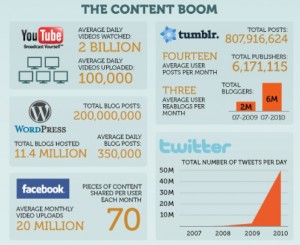Content marketing is a marketing tactic of creating and distributing content that is relevant and valuable to a specific target audience. This content, or engagement objects as I like to call them, aim to attract, acquire, and engage a clearly defined and understood audience – with the objective of driving profitable customer action.
Are Content Marketing, Social Media and Viral Marketing all the same thing?
In my interpretation, content marketing is the specific creation of content intended for sharing. When I think of sharing, I think of 2 things:
1) Social Media and if you do too, then you’re right. Content Marketing has been around for many years and has many names but it has seriously taken off with the rise of Social Media and its ability to share large file formats easily and without having to have the software to play/ watch/ read/ download the information/ entertainment.
2) The 2nd thing I think of is viral campaigning. If you’re in advertising and you’re thinking viral, that’s not what content marketing is. Brands that create online advertising campaigns with the intention of ‘going viral’ often fail. To go viral the formula usually requires 1 part hilarity + 1 part grotesque + 1 part rude. Most branded content cannot live up to these requirements for many reasons including risk aversion and strict brand guidelines but mostly because its bloody hard to get it right.
 So content marketing and social media go hand in hand. Content marketing is definitely intended for sharing but it is far more earnest than viral marketing. Content marketing or branded content can come in many forms and many of them can easily be classified as a form of social media. In my 9 year online marketing career I have referred to content marketing mostly as ‘engagement objects’ as an acquisition tactic. For the record, I consider engagement objects as an element of a successful content strategy, not a strategy in their own right, but both of these terms are relatively new (as in circa 2009-10) – those terms being ‘content marketing’ and ‘engagement objects’.
So content marketing and social media go hand in hand. Content marketing is definitely intended for sharing but it is far more earnest than viral marketing. Content marketing or branded content can come in many forms and many of them can easily be classified as a form of social media. In my 9 year online marketing career I have referred to content marketing mostly as ‘engagement objects’ as an acquisition tactic. For the record, I consider engagement objects as an element of a successful content strategy, not a strategy in their own right, but both of these terms are relatively new (as in circa 2009-10) – those terms being ‘content marketing’ and ‘engagement objects’.
Engagement objects – video, white papers, infographics, presentations
If sharing is the intention behind any web content being planned then of course the brand will need to make an effort to create content that is highly informative or entertaining, but most importantly, relevant to its intended audience. Engagement objects are, by their design, content that is produced to engage and hook the user so as to start an ongoing conversation.
Blogs, video and infographics are the most common form of engagement objects that content marketers use. White papers or e-Books are often used as an acquisition tool to obtain prospective customers’ details before sharing a report or piece of research. Photo galleries, graphs, presentations, data mashups, email newsletters and podcasts are all other forms of content marketing. Like any form of marketing, some are more engaging than others, but they all are intended for distribution with the hope of on-sharing.
Content Marketing Channels and Networks
Some content marketing channels that you may be familiar with are youTube, Flickr, SlideShare and any other social media platform such as LinkedIn, Twitter, Facebook and Google+.
I am sharing this mostly because I find it amusing. Slideshare is claiming to be the “quiet giant of content marketing” in a recent infographic shown below. For those of you who are not acquainted, Slideshare is a content sharing platform for presentations, documents, videos, and generally any conference or business type materials. As social media has risen, with its foundation in the telling of stories and sharing of information (for individuals and brands), so has content marketing. As this sharing phenomenon has grown, so has Slideshare – mostly piggy-backing off of LinkedIn, its launch partner in 2008, an excellent strategy to raise awareness amongst a business (B2B) audience. A great case study, but not quite a giant yet in my opinion.
What is Content Marketing?
In summary I’m going to quote from the experts and someone who has said it much more eloquently than I can, Junta42.
“Content marketing is the art of communicating with your customers and prospects without selling. It is non-interruption marketing. Instead of pitching your products or services, you are delivering information that makes your buyer more intelligent. The essence of this content strategy is the belief that if we, as businesses, deliver consistent, ongoing valuable information to buyers, they ultimately reward us with their business and loyalty.”

Trackbacks/Pingbacks